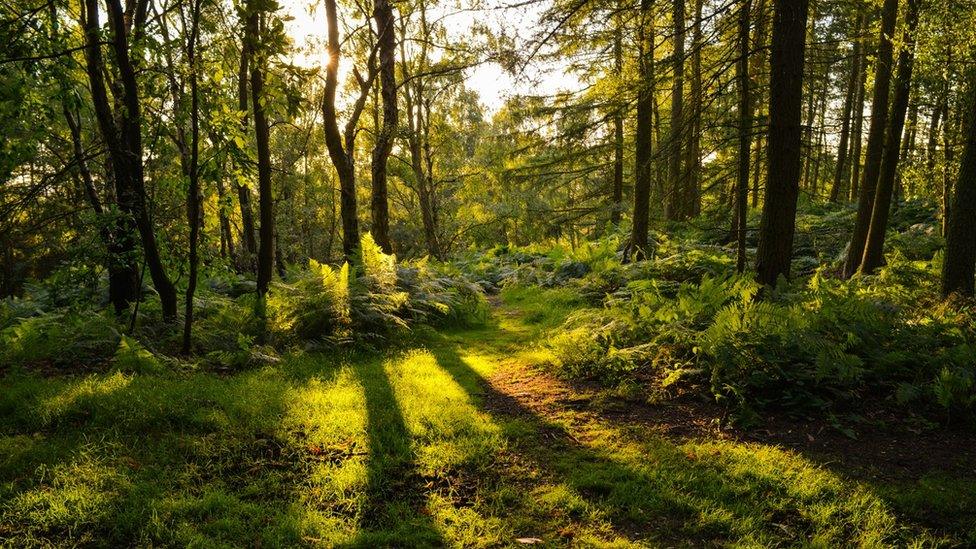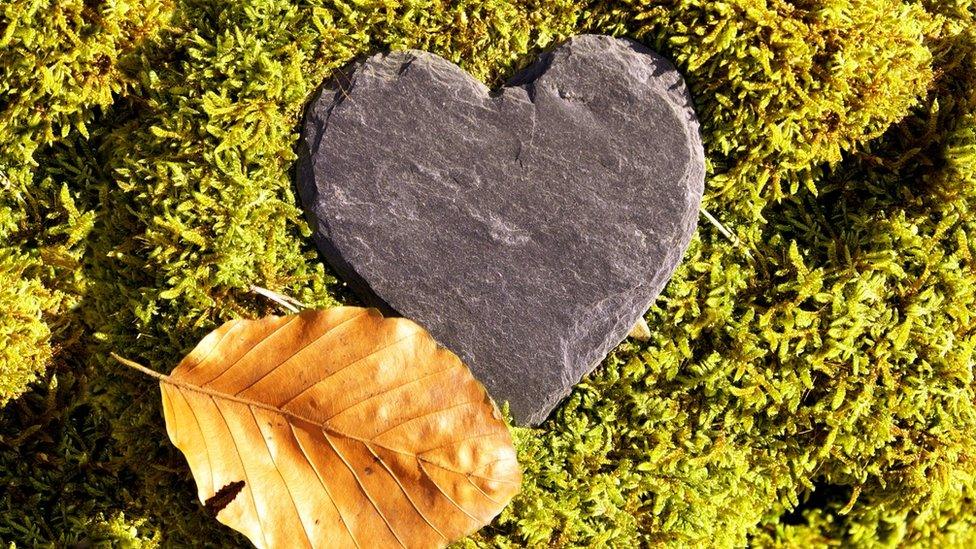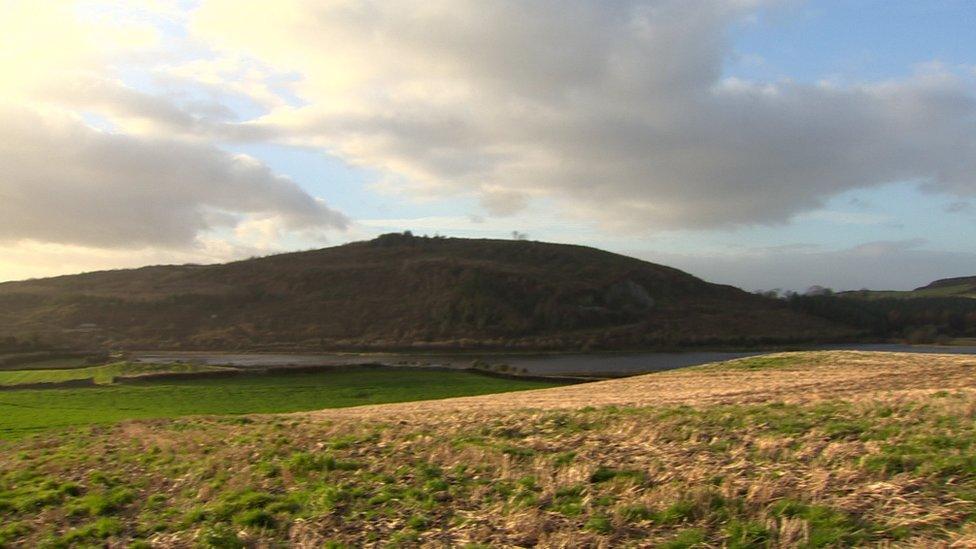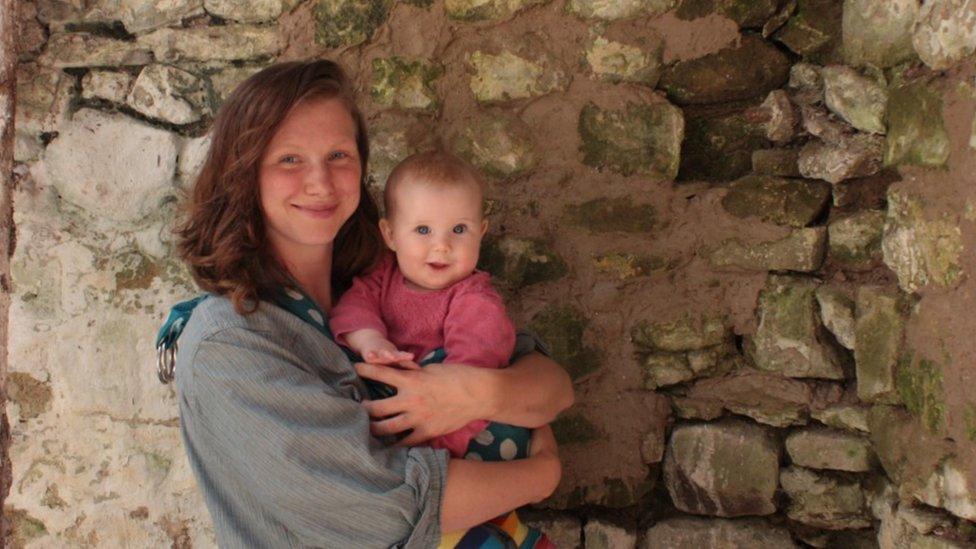Natural burial: Is an eco-friendly funeral possible in Northern Ireland
- Published

There are 270 natural burial sites across the UK
What would you like to happen to your remains after you die?
It's a question some would probably rather not think about, but an increasing number of people want to plan for a more ecologically friendly departure.
There are 270 natural burial sites across the UK, which require bodies to be buried in biodegradable coffins without using embalming fluid.
However, no such sites currently exist in Northern Ireland.
Rosie Inman-Cook manages the Natural Death Centre, a charity which offers advice on environmentally-friendly funerals.
She is frequently contacted by people in Northern Ireland looking for information and help regarding natural burials.
But she can only advise them to go to the Republic of Ireland, where there are currently two natural burial grounds, one in County Wexford and one in County Galway.
"You can have a green burial in Northern Ireland, you can ask for a sustainably produced coffin, but you'll have to go into a regular cemetery or graveyard," she said.
"That's not the same as being buried amongst new woodland and wildflowers."
Trees are often planted at natural burial sites, intended to create a memorial nature reserve.
Toxic emissions
While most people in Britain are cremated, about 80% of people who die in Northern Ireland are buried.
"From an ecological point of view this is great," Ms Inman-Cook said.
"Cremation is the absolute worst thing you can possibly do as your last act on the planet - it's sending all your personal carbon straight up the chimney."
She said the average cremation releases more than 80 kilos of carbon dioxide into the atmosphere, along with other toxic emissions such as mercury vapour.
"Multiply that by the half a million people cremated every year in the UK and you'll soon see it's 10s of thousands of tonnes of carbon dioxide coming from crematoria - just in the UK.
"When you are buried, you are sequestering the carbon you've accumulated through your lifetime, along with the carbon in your coffin and you're locking it in the ground.
"Environmentally speaking, any sort of burial is better than cremation," she said.

Graves can be marked with a piece of local stone
However, methods used to embalm bodies before burial can hardly be described as green.
Embalming fluid contains formaldehyde along with other other chemicals which can be extremely toxic and can lead to soil contamination.
Natural burial grounds strictly forbid its use.
Apart from being environmentally friendly, natural burials - sometimes known as woodland burials - can be far cheaper than a conventional funeral.
Instead of a large granite headstone, graves are identified by a tree, a plant or a marker made from local stone or wood.
Biodegradable coffins manufactured from materials such as willow, banana leaf or unvarnished pine can also cost much less than than a traditional coffin.

Planning permission for a natural burial site near Downpatrick, County Down was refused
Although there is no specific legislation in place to prevent anyone from establishing a natural burial ground, there are a few factors which need to be considered when choosing a site.
A proposal for a natural burial facility near Downpatrick, County Down was refused by planners in 2019.
Ms Inman-Cook said the biggest barrier to creating any new cemetery, natural or conventional, is planning permission.
"The main concern is the contamination of ground water," she said.
"But there are also concerns that slow moving corteges will cause accidents, so government authorities want safe access on and off the public highway."
Archaeological concerns can also be a planning issue.
Perfect for farmers?
But Ms Inman-Cook said there could be many suitable locations for a new natural burial ground in Northern Ireland.
"I like it when I get a call from a farmer," she said.
"They're the luckiest with planning applications because they know the land, they know their neighbours and they have a deep rooted, generational interest in their area.
"Some of the best natural burial ground managers are diversifying farmers. It's perfect for them because they can use up a piece of land that's perhaps not particularly productive."

"It feels important to me to protect nature," says Rose Mai Celeste
Rose Mai Celeste, an end-of-life doula who supports dying people and their families, said the simplicity of a natural burial appeals to her.
"I live in a very simple way so I want to die in a simple way with no frills attached," she said.
"Natural burial sites are very beautiful places.
"It feels important to me to protect nature and not cause harm to the environment, in death as in life."
Dispelling the myths
Ms Celeste, originally from North Yorkshire, lives on a farm in County Armagh with her partner and baby.
She has been interested in death from a young age, working at a funeral directors as a teenager before training in end-of-life care.
"I grew up next to a natural burial ground so it was always very normal," she said.
"It can make people very uncomfortable thinking about these things, but it's about dispelling the myths around what a burial should be."
The potential financial savings are also appealing.
"It can be so cheap, I don't think people realise that a funeral doesn't have to cost thousands of pounds," she said.
When you have a natural burial your family can do the funeral, you don't need to use a funeral director - you can do it all yourself.
"It doesn't need to be anything fancy, you don't need to use any resources at all - it should be a very simple process."
She said the absence of a natural burial site in Northern Ireland is not due to lack of public interest.
"There's a growing awareness of different options around death," she said.
"There might be factors which mean you can't in some areas, but establishing a natural burial ground here is essentially very doable.
"There just needs to be one person who does it first, then others will follow."
Related topics
- Published11 January 2017

- Published30 September 2010